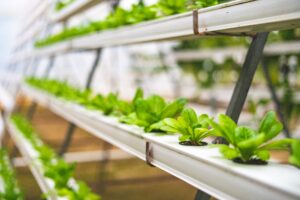World Hunger Day serves as a stark reminder of the persistent challenge of food insecurity faced by millions of people worldwide. However, it is essential to recognise that addressing global hunger is not only a humanitarian imperative but also a critical step in tackling the climate crisis. The interconnection between food systems, sustainable agriculture, and climate change highlights the urgent need to ensure adequate nutrition for all while transitioning to more sustainable practices. In this article, we will explore the significance of World Hunger Day and how feeding the global population is a key step in addressing the climate crisis.

Sustainable Agriculture and Emissions Reduction
Agriculture is a significant contributor to greenhouse gas emissions, primarily through deforestation, methane emissions from livestock, and the use of synthetic fertilisers. However, transitioning to sustainable agricultural practices can play a pivotal role in reducing emissions. Implementing agroecological techniques, such as organic farming, agroforestry, and precision agriculture, can minimise the environmental impact of agriculture while improving soil health, water conservation, and biodiversity. By promoting sustainable agricultural practices, we can mitigate climate change while ensuring food security.
Resilient Food Systems and Adaptation
Climate change poses a significant threat to food production and stability, particularly in vulnerable regions. Extreme weather events, changing rainfall patterns, and rising temperatures can disrupt agricultural productivity and exacerbate food insecurity. To build resilience, we need to invest in resilient food systems that are adaptable to climate change impacts. This includes diversifying crops, improving water management, supporting small-scale farmers, and enhancing access to climate-resilient seeds and technologies. Strengthening food systems not only ensures access to nutritious food but also helps communities adapt to climate challenges.
Reducing Food Loss and Waste
One-third of the world’s food is lost or wasted each year, which not only squanders valuable resources but also contributes to greenhouse gas emissions. Food production requires energy, water, and land resources, all of which contribute to the carbon footprint of the food we consume. By reducing food loss and waste throughout the supply chain, we can conserve resources, reduce emissions, and address food insecurity. Innovative strategies such as improved storage facilities, efficient distribution systems, and consumer education campaigns can help minimise food waste and maximise food utilisation.
 Sustainable Diets and Emissions Reduction
Sustainable Diets and Emissions Reduction
Shifting towards sustainable and climate-friendly diets is crucial in mitigating the climate crisis. Animal agriculture, particularly the production of meat and dairy, has a substantial carbon footprint. Transitioning to plant-based diets or reducing meat consumption can significantly reduce greenhouse gas emissions, conserve land and water resources, and alleviate pressure on ecosystems. Promoting sustainable and nutritious diets, rich in plant-based foods, can simultaneously improve public health and contribute to climate change mitigation.
Global Collaboration and Policy Support
Addressing global hunger and the climate crisis requires international collaboration, policy support, and investment. Governments, organisations, and individuals must work together to create enabling environments that promote sustainable agriculture, support small-scale farmers, strengthen food systems, and improve access to nutritious food. Funding initiatives that empower communities, promote research and innovation, and prioritise climate-smart agriculture can make a substantial impact on both hunger alleviation and climate change mitigation.
World Hunger Day highlights the urgent need to eradicate hunger and malnutrition worldwide. However, feeding the global population is not only a matter of human rights and social justice but also a critical step in addressing the climate crisis. By promoting sustainable agriculture, reducing food loss and waste, advocating for climate-friendly diets, and strengthening food systems, we can ensure food security while mitigating greenhouse gas emissions and building resilience. The fight against hunger and the fight against climate change are deeply interconnected, and by addressing one, we take a significant stride toward resolving the other. It is our collective responsibility to ensure that no one goes hungry while we work toward a sustainable and climate-resilient future.






